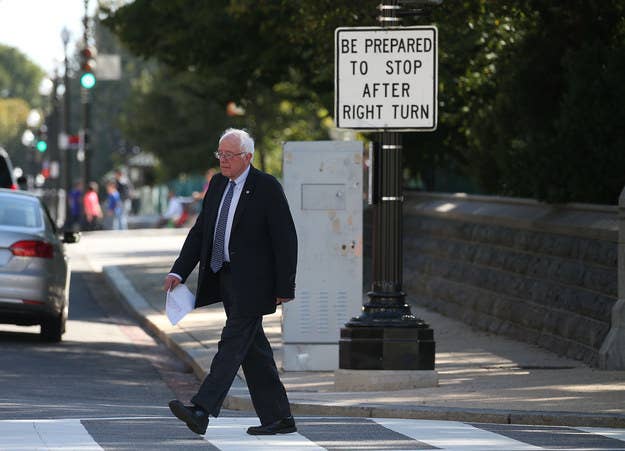
BOULDER, Colorado — The newest issue of the moment suddenly baked into Bernie Sanders's stump speech is gun control, and the latest attempt by Sanders to reject critics who say he runs to the right of his fellow Democratic presidential candidates on an issue that increasingly unites the party.
Often underplayed in coverage of Sanders is how spry his campaign is when it comes to hot-button issues that threaten to knock the Vermont independent senator off his economic message. When activists supporting the Black Lives Matter movement disrupted his early campaign events, Sanders tacked on his history as an activist and progressive mayor to his stump speech, finding a way to embrace the movement through his past and inserting it into his stump speech. When Sanders’ opposition to the 2007 immigration reform bill started drowning out his economic pitch to Latino voters, he started talking up his support for the 2013 immigration bill and its path to citizenship.
The stump speech itself remains remarkably consistent. No matter the audience, the majority of the address is about billionaires overpowering the middle class and an economic structure that, he says, treats the majority of the country unfairly and stifles social mobility. But the non-economic section speaks to what’s on Sanders’ mind, and what’s worrying his strategists.
The weekend before his first televised debate with the major candidates in the Democratic field, the Sanders stump was about guns.
“Gun violence in our country, everybody here knows, is a very serious issue and one that, tragically, Colorado is all too familiar with,” Sanders told an estimated 10,000 people standing in the sun on University of Colorado sports field. “Now I am not going to stand before you today and tell you that there are easy answers, either from a public policy point of view or from a political point of view. Because if I told you that, I would not be telling you the truth.”
Sanders then detailed the pitch for a less incendiary, more consensus-focused gun violence debate he began making in the wake of the Oregon community college shooting. It centers around the legislative changes that poll well: expanded background checks, cracking down on straw purchasers, a ban on so-called assault weapons, and a renewed effort to improve mental health care in the country. He made similar comments the night before when he delivered his stump speech in Tucson, Arizona.
The focus on national legislative changes to address gun violence is a shift to the left for Sanders, who has carried a rural Vermont sensibility on firearms to Congress in the past. He began to break from that tradition after the 2012 school shooting in Newtown, Connecticut, and has pushed farther from it as Democrats on the presidential campaign trail have taken swipes — both subtle and less than subtle — at him over a history on guns that has at times broken from the progressive gospel.
Sanders took another step to the left on Sunday when he appeared to break with months of rhetoric from his campaign and reverse himself on a 2005 vote in favor of a shield law that protected gun manufacturers from liabilty after their products are used unlawfully. Sanders’ vote for the law has been a key line of attack when other Democrats try to draw contrast with him on guns; Clinton vowed to repeal the law last week.
Sanders and his allies have strongly defended his vote until this weekend. On CNN in July, he likened the push against the law to trying to “hold a hammer company responsible if somebody beat somebody over the head with a hammer.”
“That is not what a lawsuit should be about.”
On Meet The Press Sunday, however, Sanders reversed himself, saying that there are times when it is worthwhile to hold manufacturers responsible for gun crime. His vote, he said, was about protecting small businesses. (The shift was previewed by his campaign manager in an interview Thursday.)
“That was a complicated vote and I'm willing to see changes in that provision,” Sanders said. “Here's the reason I voted the way I voted. If you are a gun shop owner in Vermont and you sell somebody a gun and that person flips out and then kills somebody, I don't think it's really fair to hold that person responsible, the gun shop owner.”
But it is time to think about holding the manufacturers responsible in some cases, Sanders went on.
“Where there is a problem is there is evidence that manufacturers, gun manufacturers, do know that they're selling a whole lot of guns in an area that really should not be buying that many guns,” he said. “That many of those guns are going to other areas, probably for criminal purposes. So can we take another look at that liability issue? Yes.”
It was a shift away from Sanders’ voting past and toward the modern gun control lobby. Sanders regularly points out he has a “D-minus” rating from the National Rifle Association and, in the Meet The Press interview, rejected the suggestion he’s a gun control “moderate.”
Gun control lobbyists continue to be skeptical of Sanders, however.
“He needs to support full repeal of immunity, period,” said Ladd Everitt, spokesperson for the Washington-based Coalition To Stop Gun Violence. “It is a heinous law and an affront to victims and survivors.”
Senior Sanders supporters mostly rebuff the idea that Sanders is open to attack on guns. The issue has dogged him since the start of his rise as a presidential candidate — and his poll numbers have continued to go up and his progressive base of support grow.
